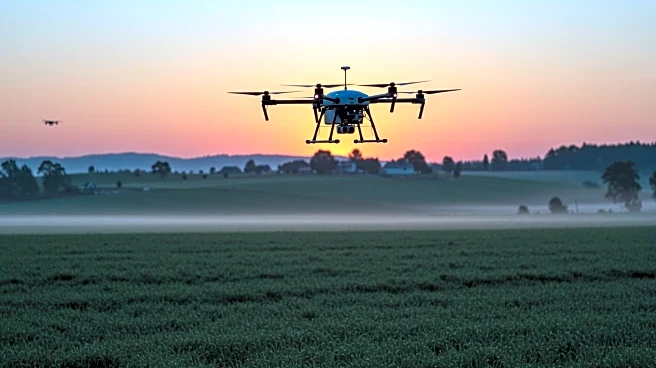What is the story about?
What's Happening?
Precision agriculture is revolutionizing farming practices in Canada and the United States, driven by advanced technologies such as GPS, remote sensing, drones, IoT sensors, and digital platforms. By 2025, over 60% of Canadian agriculture jobs will require skills in precision technology and data analysis. This shift is creating new job opportunities across the agricultural value chain, blending traditional crop knowledge with cutting-edge technology. The USDA is committed to fostering research and programs that promote technology adoption, sustainability, and skilled workforce development. In Canada, federal and provincial incentives are encouraging investment in agritech startups and scaling digital farm systems, while academic institutions are updating curricula to include digital management and AI-driven decision tools.
Why It's Important?
The adoption of precision agriculture is crucial for enhancing productivity, resource management, and sustainability in farming. It minimizes inputs, maximizes outputs, and reduces environmental impacts, making agriculture more resilient and competitive. The integration of technology is expected to boost job growth in Canada’s agri-tech sector by 25% in 2025, creating demand for roles such as agronomists, GIS specialists, drone operators, and AI analysts. This transformation supports climate-smart solutions, optimizing water use, reducing chemical run-off, and tracking carbon footprints, which are essential in addressing climate variability and evolving consumer expectations.
What's Next?
By 2025, autonomous machinery powered by AI will perform key farm tasks with minimal human intervention, reducing labor costs and risks. AI and machine learning will analyze field data to improve irrigation schedules and predict fertilization needs. Robotics will enhance field productivity with precise weeding, spraying, and harvesting. Digital decision platforms will provide real-time insights for precise adjustments, maximizing output and minimizing waste. These advancements will continue to reshape the agricultural workforce, requiring continuous learning and adaptation from professionals in the sector.
Beyond the Headlines
The ethical and environmental implications of precision agriculture are significant. It promotes sustainable farming practices, reduces chemical usage, and enhances supply chain transparency through blockchain-based traceability solutions. As technology becomes the backbone of agricultural operations, it also raises questions about data privacy, the digital divide, and the need for regulatory frameworks to ensure fair and equitable access to these innovations.















